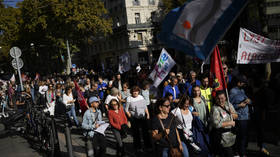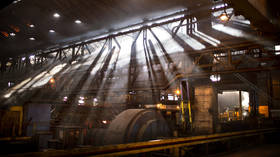Soaring inflation triggers national strike in France

A national strike in France on Tuesday has seen trains canceled and schools closed as trade unions demand higher salaries for workers amid soaring inflation and an energy crisis.
According to one of the country's largest trade unions, CGT, the protesters are calling for “an increase in wages, pensions and social minimum, and the improvement of living and study conditions.”
CGT explained in a statement that today’s industrial action is an extension of the weeks-long refinery strike that has closed gas stations across the country. The trade union accused management of oil giants – Total and Exxon in particular – of “making huge profits” while ignoring the demands of employees hit by the cost-of-living crisis.
As the protest movement is picking up steam not only in the energy industry but across “both public and private sectors,” the union said that now is the time for “employees, retirees, the unemployed and young people” to join the industrial action.
France’s inflation rate currently exceeds 6%, while almost all of the country’s industrial sectors have recorded a drop in activity due to the burgeoning energy crisis, which has been exacerbated by anti-Russia sanctions and the sharp decrease in Russian energy supplies.
The strike, which is supported by several large unions, has led to massive disruptions. SNCF, the national state-owned railway company, issued a warning that traffic would be disrupted “on several lines.”
The Eurostar rail service announced that it had to cancel certain trains between London and Paris due to the work stoppage.
Maritime transport could also be impacted, as several ports and docks announced that they would cease working for several hours on Tuesday.
The strike has forced some schools to close as the first official figures from the Education Ministry show that about 6% of teachers are participating in the action. The number is particularly high at vocational high schools, where the participation rate has reached almost 23%.
Several cities, including Paris, Bordeaux and Rennes, have seen thousands of people take part in various rallies, with more protests planned in the afternoon.
Meanwhile, one of the country’s ministers, commenting on the strike on Tuesday, accused its participants of not adhering to the “culture of dialogue.”
“I understand that a certain number of employees may express expectations of improved purchasing power. But I tell them that in Europe, we are the government which has protected its residents the most in terms of inflation,” Christophe Bechu, the minister for ecological transition, told Europe 1.
The official emphasized that strikes are further aggravating a state of affairs that is already difficult enough due to “the war in Ukraine” and the broader economic situation.












